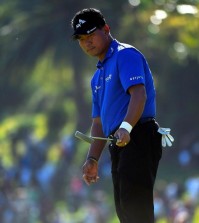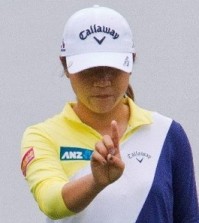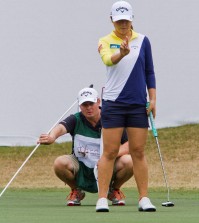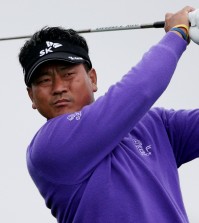- California Assembly OKs highest minimum wage in nation
- S. Korea unveils first graphic cigarette warnings
- US joins with South Korea, Japan in bid to deter North Korea
- LPGA golfer Chun In-gee finally back in action
- S. Korea won’t be top seed in final World Cup qualification round
- US men’s soccer misses 2nd straight Olympics
- US back on track in qualifying with 4-0 win over Guatemala
- High-intensity workout injuries spawn cottage industry
- CDC expands range of Zika mosquitoes into parts of Northeast
- Who knew? ‘The Walking Dead’ is helping families connect
K.J. Choi believes teams evenly matched at Presidents Cup
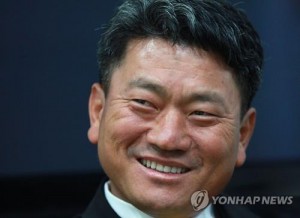
South Korean golfer Choi Kyoung-ju, affectionately known as K.J. Choi, smiles during an interview with Yonhap News Agency in Seoul on Oct. 2, 2015. (Yonhap)
SEOUL (Yonhap) — Based on the players’ world rankings, the United States appears to be heavily favored over the International Team at this year’s Presidents Cup, which will open in South Korea next week.
Still, as Choi Kyoung-ju, vice captain for the International Team, sees it, the teams will be more evenly matched than people think, especially among the top guns.
“I don’t think there’s much separation between the U.S. side and ours, at least as far as the top eight players,” Choi said in an interview with Yonhap News Agency on Friday. He arrived in South Korea earlier in the day to prepare for the Oct. 8-11 competition. The first Presidents Cup in Asia will take place at Jack Nicklaus Golf Club Korea in Incheon, just west of Seoul.
“If we are to win, it won’t be by a big margin,” said Choi, an eight-time PGA Tour winner better known by his initials, K.J., outside South Korea. “I don’t think we will be blown away, either.”
This will be the 11th edition of the Presidents Cup, which started out in 1994. The United States Team has won eight of the first 10, and the two sides ended in a tie in 2003.
This year, the Americans will be led by six of the world’s top-10 players, including No. 1 Jordan Spieth, who captured the Masters and the U.S. Open this year. The International Team has only one player inside the top 10 in the world rankings, the No. 2-ranked Jason Day.
Spieth is joined by two-time Masters champion Bubba Watson, the 2015 Open champion Zach Johnson and rising youngster Rickie Fowler, among others. Day’s supporting cast, though not quite as star-studded, features former No. 1 Adam Scott and ex-Open champion Louis Oosthuizen.
As a veteran of three Presidents Cups, Choi, who works with captain Nick Price and assistants Tony Johnstone and Mark McNulty, said he feels crowds can make as much an impact on the players as any strategies devised in the club house.
“We can get together and try to come up with all the tactics and strategies we want, but the fan support will be quite important too,” he said. “The players will be able to feed off the crowd energy, and I hope the South Korean fans will be behind the International Team.”
Since the Presidents Cup is alternately held in the United States and a non-European nation, the International Team will technically be the home team next week. The International Team will feature one South Korean player in Bae Sang-moon, while Danny Lee, now a New Zealander, was born in Incheon and still has relatives in that city.
Yet with most of the high-profile players on the Americans’ side — Phil Mickelson, one of the most recognizable golfers, made the U.S. Team as a captain’s pick — Choi quipped he was “worried” that the South Korean fans would root for the Americans.
“I hope the fans will be united and get behind the International Team,” he said. “As long as they don’t interrupt shots or putts, they can give louder cheers for our players than for the Americans.”
Choi said recent format changes to the Presidents Cup, which included the reduction of the total number of points from 34 to 30, could work in the International Team’s favor. There will be five fourball matches on the first day and five foursome matches on the second day, down from six in each of the first two days in previous competitions.
The changes mean the players are only required to take part in at least two of the first four sessions, as opposed to three of the first four segments. It will allow the International Team to keep struggling or out-of-form players stashed and let its top dogs pick up the slack in the early going.
On the other hand, Choi said it puts pressure on Price and the rest of the leadership group to come up with the winning formula.
“We have to capitalize on our opportunity and send out the best pairings that can maximize our chances of winning,” he said. “We have to win at least 2.5 points out of those five matches (in each of the first two days). We don’t want to fall behind early and put too much pressure on the players in the singles on the final day.”
Choi said the International Team also faces a unique challenge in that its players all come from diverse ethnic and cultural backgrounds. The American players all speak the same language and are familiar with each other, since they all ply their trade on the PGA Tour. The International Team members are scattered around the PGA Tour, the European Tour and the Asian Tour. On this year’s team, seven different countries are represented.
“I think the International Team players have generally struggled in foursomes, with the alternate-shot format,” Choi noted. “It is really about mutual trust, believing that your teammate will pick you up after a bad shot. You need to build chemistry over a long time, but most of these players spend the season on different tours and get together just for this occasion. They may recognize each other, but they may not know each other’s tendencies. The key is to build camaraderie in just a few days, but it can be difficult.”
With so many things on his plate, Choi said it’s infinitely more stressful being a non-playing vice captain than being a participant on the field at the Presidents Cup.
“As a player, you could just practice on your own, show up on time, and go out and play with your partners,” he said. “As a vice captain, I have to think about our pairings, and how we should respond if the U.S. Team comes up with tandems that we didn’t expect. And if our players execute their game plans and still lose, then the onus falls on the leadership. I think it was much easier being a player. Since this year’s Presidents Cup is in South Korea, I’d like to win that much more.”








